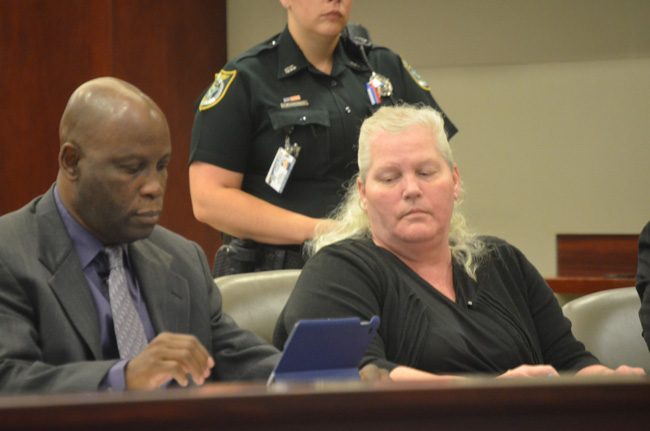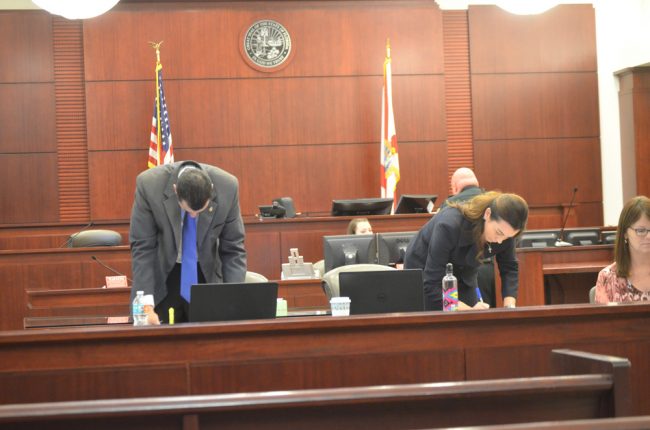
Circuit Judge Dennis Craig this morning conceded that DNA evidence that may be central to the murder trial of Dorothy Singer was produced late by a state crime lab, and turned in late to the defense. But if evidence was turned over late, rules of evidence were not violated, the judge ruled.
Against the defense’s objections, Craig ordered the trial to proceed, as it did with jury selection for the rest of the day.
Craig, who’d walked into the courtroom seemingly ready to proceed before he’d settled in his chair, also denied without comment a motion by the defense to have Craig disqualified. “All right, denied. Ready to go?” Craig said, referring to one of the defense’s motions, seconds after taking his seat. The curtness was an echo of the sparring that has characterized interactions between Craig and Singer’s defense attorney in the last three weeks.
Junior Barrett, the defense attorney for Singer, immediately filed an emergency stay at the Fifth District Court of Appeal.
This morning’s 45-minute hearing before the jury pool of 50 potential jurors was brought in was the third since April 25 involving irregularities in the way evidence was finally made available either to the prosecution or to the defense, and challenges to Craig’s impartiality. It remains unclear why, other than because the trial had been scheduled months ago to start today, the judge pressed on April 25 and May 3 to stick to the date despite considerable–and legitimate–objections by the defense, as he did so again today. Cases involving far less consequential charges than a first-degree murder charge are routinely continued when lesser issues arise. But there is this: Craig, who enjoys trials, is being transferred to Volusia County’s criminal court at the beginning of June. He may have been intent on getting his last major case in Flagler tried on his watch. (He will be replaced here by Judge Terence Perkins, who is transferring from Volusia.)
Singer, 53, is accused of shooting her husband, Charles Singer, 48 at the time, at their home at 80 Pine Tree Lane in western Flagler County. The Flagler Sheriff’s investigation alleges that Singer shot her husband five times as he slept. The defense is going to argue that the couple had been arguing and that the shooting was self-defense. She faces a first-degree murder charge. If found guilty, she faces life in prison. This is not a death penalty case.
DNA analysis became a sticking point for two reasons. First, the defense was not prepared for a DNA analysis that showed Charles Singer’s blood on the headboard of a bed in the couple’s master bedroom: according to Barrett, Dorothy Singer had told him that there couldn’t possibly be any of Charles’s blood on that headboard. But DNA analysis conducted by the Florida Department of Law Enforcement appears to have found otherwise.

Barrett was not prepared for that result. He sought to delay the trial to have time to depose a DNA expert who could independently analyze the results, perhaps addressing the matter of the blood’s age: it could have been shed there not at the time of the alleged murder, but previously. The judge did not grant that delay, blaming Barrett for not being prepared, strategically, to deal with the possibility that the blood would be tied to Charles Singer.
But that raised the second issue. Even if Barrett had been prepared, he’d had no time to conduct his analysis. The state police lab completed the DNA analysis in late March. But it did not give the results of the analysts to Jennifer Dunton, the assistant state prosecutor on the case, until April 24, the day before “docket sounding,” a court hearing that constitutes the last step before trial. She shared the results with Barrett by email.
Today, Dunton explained to the judge that even though a DNA analysis may be completed, as the March date on the report reflected, it still had two more review steps to clear before it was made available–a technical and an administrative review. That’s why it was turned in so late, she said.
“When would this material been available to the defense?” Craig asked Dunton.
“After it was finalized and FDLE was done,” she said. “He didn’t have results yet to determine whether he’d need to have an expert look at it,” Dunton continued, at that juncture essentially arguing Barrett’s point. “My requirement is to disclose information as I receive it,” Dunton said. “As soon as I had that report in hand it was emailed to Mr. Barrett.”
That was on May 2. Even Dunton thought the lateness of the DNA analysis would lead to a delay in the trial, she said.
Barrett argued that while Dunton acted correctly, the results were in the state’s hands long before, since the FDLE crime lab is the state.
“It’s late, I agree with you, when I say it’s late it’s late in the process,” Craig told Barrett, but the judge specified: the lateness is not the same thing as a rule violation under the rules of evidence.
That seems to have been the case, but more through the strictest construction of the rules than according to procedures construed as fairly as possible toward a defendant. Part of Barrett’s objections to Craig’s approach was his earlier statements on two occasions in hearings running up to this trial that the FDLE lab was essentially infallible.
Barrett and Craig traded subtle jabs this morning, Craig asking Barrett, who kept talking, “Can the court ask a question of counsel?” Barrett asking to finish his statement, Craig telling Barrett that one of his motions should have quoted Craig’s words about FDLE infallibility directly rather than paraphrase them, Barrett saying he couldn’t have quoted him directly without a transcript of the hearing. “To get a transcript I’d need a stay,” Barrett said. A stay Craig was not willing to grant.
So it went, until Craig ruled that the court, in his words, “finds the state has not violated any discovery rules. The court would have liked to have seen the information given to the defense earlier but the court can’t find that there was a discovery violation under the circumstances.”
Since the trial was not to be delayed, Barrett also argued that the DNA results should not be admissible, as he had not had the chance to vet them himself with an expert. The judge did not rule on that, saying he would do so in the course of the trial as the issue arises. It is almost certain he will deny Barrett’s motion to exclude the evidence.
The hearing ended, and the lawyers prepared for jury selection.
The whole time Singer herself, in her first in-person appearance in court since she was jailed a year ago, sat impassively at the defense table, wearing civilian clothes for the first time in a year: a black and white dress, a light black sweater. Jury selection was expected to take most of the day to find 12 jurors out of a potential 50 (or more, if necessary), plus two alternates.
Opening arguments are set for Tuesday morning at 9 a.m. in Courtroom 401 at the Flagler courthouse. The judge has set aside Tuesday, Thursday and Friday for the trial.
Assistant State Attorney Jason Lewis is co-counsel with Dunton. Kevin Carlisle is Barrett’s co-counsel.
In a rare contrast with the tenor of the hearing and the charge Singer faces, there was–as there always is–the occasional lighter moment during jury selection as jurors answer the rapid fire of questions from the judge or either side’s attorneys. When Craig asked one juror what she did for a living, she answered: “I am a domestic goddess.”
He’d not heard that one before.





























Leave a Reply